

Nicky Clements. BLOG: Leading in Early Years Supporting Covid… OPAL - A Different Way to Look at Assessment in Early Years. Today I am sharing a blog post from Janine and the team at Barnet Early Years Alliance.
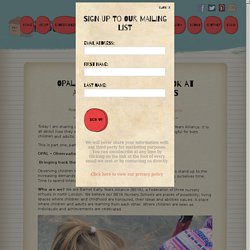
It is all about how they are making observation and assessment more meaningful for both children and adults. This is part one, part two next week…. Home Learning. We are part of a wonderful, international community of Early Years practitioners who have a wealth of knowledge and a HUGE bank of ideas and activities, so let's share them!
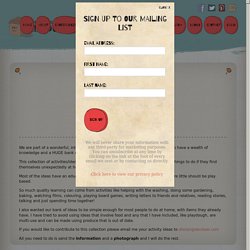
This collection of activities/ideas is simply here to help parents and carers find fun things to do if they find themselves unexpectedly at home with younger children. Most of the ideas have an educational slant but we believe that learning when you're little should be play based. So much quality learning can come from activities like helping with the washing, doing some gardening, baking, watching films, colouring, playing board games, writing letters to friends and relatives, reading stories, talking and just spending time together! I also wanted our bank of ideas to be simple enough for most people to do at home, with items they already have. I have tried to avoid using ideas that involve food and any that I have included, like playdough, are multi-use and can be made using produce that is out of date. Webinars. Leading Playground Specialists - Timotay Playscapes. Bespoke playground design and build. Harnessing the power of story.
How might picture and story books enhance the mathematical experience we offer our young children, birth to seven?
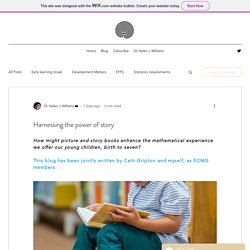
This blog has been jointly written by Cath Gripton and myself, as ECMG members. All children are entitled to a strong mathematical foundation which is achieved by the integration of both child- initiated play and adult teaching through meaningful contexts. Young children are naturally mathematical problem solvers, inquirers and sense-makers. Maximising Learning in Continuous Provision - The Water Area. Exploring and experimenting with water is a key fascination of many children – and if you have it available continuously, you may even find that some children go back to it a lot!
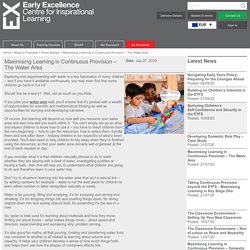
Should this be a worry? Well, not as much as you think. If you plan your water area well, you’ll ensure that it’s packed with a wealth of opportunities for scientific and mathematical thinking as well as opportunities for storying and developing narrative. Of course, this learning will depend on how well you resource your water area and also how well you teach within it. Assessment beyond levels in the early years: improving learning for all children. The DFE published the revised Development Matters in September 2020 so that the sector has a full year to get used to the new document before the changes to the EYFS Statutory Framework come into effect in September 2021.
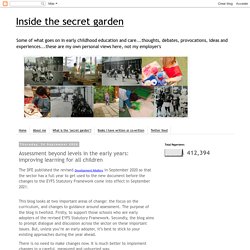
This blog looks at two important areas of change: the focus on the curriculum, and changes to guidance around assessment. The purpose of the blog is twofold. Firstly, to support those schools who are early adopters of the revised EYFS Statutory Framework. Secondly, the blog aims to prompt dialogue and discussion across the sector on these important issues. But, unless you’re an early adopter, it’s best to stick to your existing approaches during the year ahead. Earlymath.erikson. As children start using number words, they don’t always have a sense of what those words really mean.
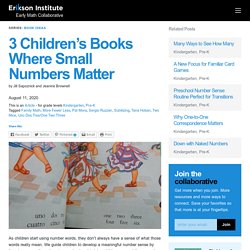
We guide children to develop a meaningful number sense by focusing on small numbers in preschool and helping children connect those number words to specific quantities. We can think of a quantity as a number plus its unit—that is, the numerosity of set that is being counted. Not just “two” but “two shoes” or “two paintbrushes.” Adults can use language to describe how many of what we are seeing as we share attention to small numbers with a child. And, books are one the best ways to look at quantities with your child. When sets of objects are small—one, two, and three—children can recognize the quantity of without counting. Here are three books that can spark talk about small sets of one, two, and three things. More, Fewer, Less by Tana Hoban. Mathematics in the Early Years: What matters? Guest blog: Time for a Key Stage 1 that is developmentally appropriate? by Julie Fisher. In September, if schools are fully reopened by then, the transition of children into Year 1 will be a significant challenge for schools.
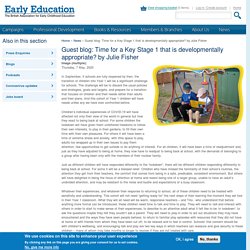
Hungry Little Minds – Simple fun, activities for kids aged 0 – 5. Opinion: Out for the count. Is there a danger that, in squeezing in so many elements, the proposed Early Learning Goals for mathematics will be unachievable for all but a few children, leading to many being assessed as failing before they start school?
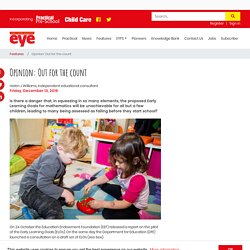
On 24 October the Education Endowment Foundation (EEF) released a report on the pilot of the Early Learning Goals (ELGs). On the same day the Department for Education (DfE) launched a consultation on a draft set of ELGs (see box). Interestingly, the goals for mathematics in the DfE consultation differ in some considerable respects to those piloted. Mystifyingly, these changes bear no relation to the results of the pilot. It is worth reading the full report as the summary bypasses some key findings. The Science of Early Learning. Early years coalition response to government EYFS consultation. Children learn through play – it shouldn’t stop at preschool.
The transition from preschool to school is a big deal for many children and parents.
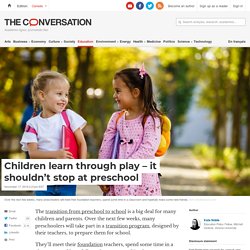
Over the next few weeks, many preschoolers will take part in a transition program, designed by their teachers, to prepare them for school. They’ll meet their foundation teachers, spend some time in a classroom and hopefully make some new friends. These children’s education has so far focused on play-based learning. This means they’ve learnt through exploring and playing, supported by skilled early childhood educators. But they’re about to enter a world of formal learning. The current system isn’t working for many students. Read more: More children are starting school depressed and anxious – without help, it will only get worse. Practitioners must speak out about the failings of proposed ELGs. Early years consultant Helen Moylett is urging early years staff to make clear in the revised EYFS consultation the 'failings' of the proposed ELG for communication and language.
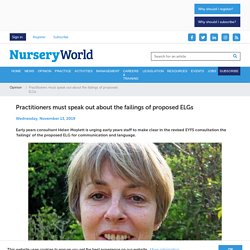
The proposed educational programme for Communication and Language in the Government’s EYFS consultation is better than it was in the pilot version in that there is more emphasis on conversation and less on reading to children. However, as in the rest of the educational programmes, there is scant recognition that the EYFS is a birth to five key stage. Building a curriculum with firm foundations.
Something that has always bemused me is the opposition that arises whenever it is suggested that what children learn in the foundation stage should prepare them to be ready for year one. The standard response to this is that the foundation stage is important in its own right and does not exist as a warm up for what comes later. It is there, so it is said, to lay the foundations for future successful learning in terms of child development rather than any specific content.
The passionate advocacy of the foundational role of the prime areas of communication and language, personal, social and emotional development and physical development for all future learning is something I would also champion. Abundant research finds that a strong foundation in the prime areas by the time a child is five is essential if a child is to thrive academically.
Without these essentials in place, further learning will be drastically impeded. Stories play a vital role in making the abstract past immediate.